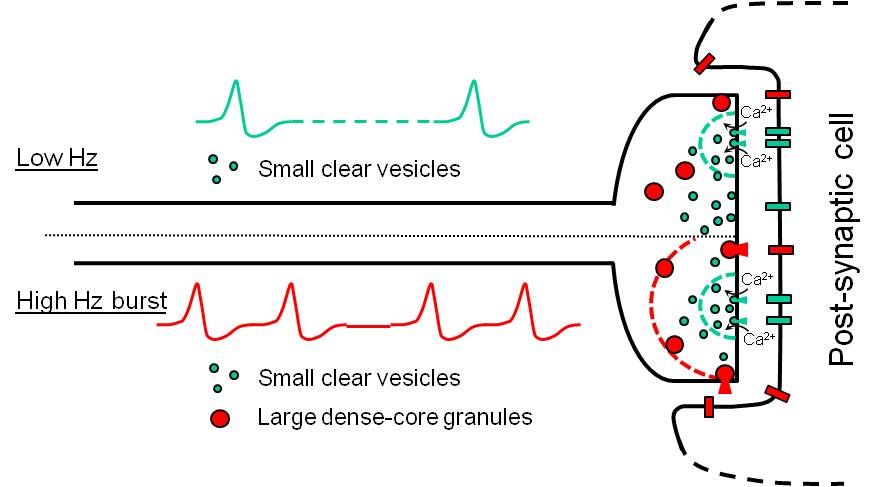 Under basal homeostatic conditions, the innervating sympathetic splanchnic nerve excites the adrenal medulla through a nictonic synaptic signaling mechanism that evokes post-synaptic release of catecholamine into the circulation. However, under sympatho-adrenal stress activation, the nicotinic signaling complex becomes de-sensitized at multiple stages. Yet, under stress activation catecholamine output increases dramatically and peptide transmitter secretion is also evoked. Recent studies have described a second, stress-evoked synaptic signaling mechanism specifically activated under sympathetic stress conditions that compensates for the adrenal nicotinic desensitization and supports massive adrenal secretion to form the peripheral stress response. The major component of the stress synaptic signaling system is the release of pituitary adenylate cyclase activating peptide (PACAP) at the splanchnic adrenal synapse. PACAP is a strong adrenal secretagogue, evoking long-lasting secretion from the adrenal medulla. We are studying the complex synaptic as well as post-synaptic signaling pathway by which PACAP forms the sympatho-adrenal stress response.
Under basal homeostatic conditions, the innervating sympathetic splanchnic nerve excites the adrenal medulla through a nictonic synaptic signaling mechanism that evokes post-synaptic release of catecholamine into the circulation. However, under sympatho-adrenal stress activation, the nicotinic signaling complex becomes de-sensitized at multiple stages. Yet, under stress activation catecholamine output increases dramatically and peptide transmitter secretion is also evoked. Recent studies have described a second, stress-evoked synaptic signaling mechanism specifically activated under sympathetic stress conditions that compensates for the adrenal nicotinic desensitization and supports massive adrenal secretion to form the peripheral stress response. The major component of the stress synaptic signaling system is the release of pituitary adenylate cyclase activating peptide (PACAP) at the splanchnic adrenal synapse. PACAP is a strong adrenal secretagogue, evoking long-lasting secretion from the adrenal medulla. We are studying the complex synaptic as well as post-synaptic signaling pathway by which PACAP forms the sympatho-adrenal stress response.